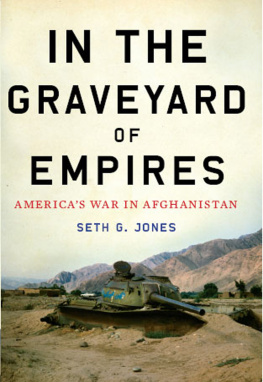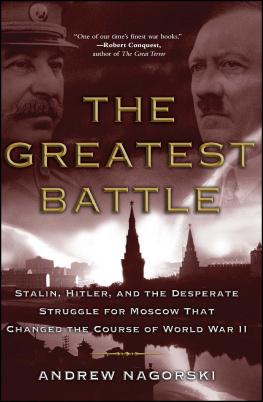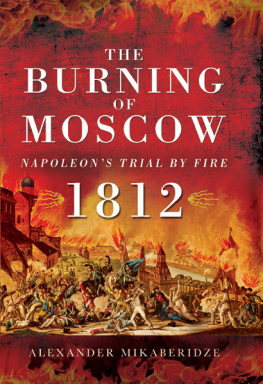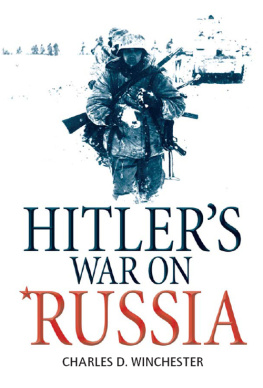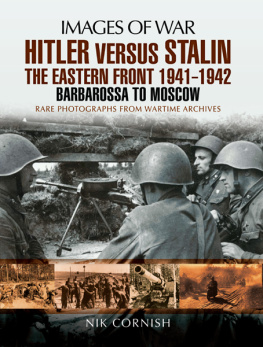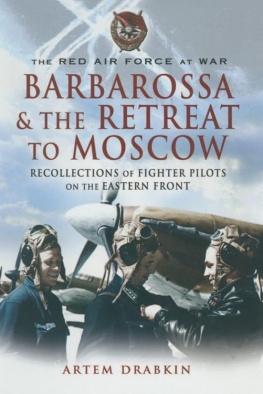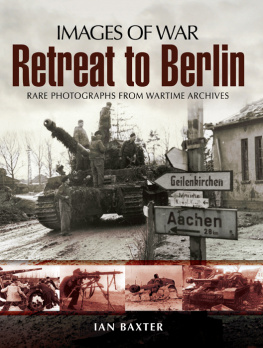Jones - The Retreat Hitlers First Defeat
Here you can read online Jones - The Retreat Hitlers First Defeat full text of the book (entire story) in english for free. Download pdf and epub, get meaning, cover and reviews about this ebook. genre: Non-fiction. Description of the work, (preface) as well as reviews are available. Best literature library LitArk.com created for fans of good reading and offers a wide selection of genres:
Romance novel
Science fiction
Adventure
Detective
Science
History
Home and family
Prose
Art
Politics
Computer
Non-fiction
Religion
Business
Children
Humor
Choose a favorite category and find really read worthwhile books. Enjoy immersion in the world of imagination, feel the emotions of the characters or learn something new for yourself, make an fascinating discovery.

- Book:The Retreat Hitlers First Defeat
- Author:
- Genre:
- Rating:5 / 5
- Favourites:Add to favourites
- Your mark:
- 100
- 1
- 2
- 3
- 4
- 5
The Retreat Hitlers First Defeat: summary, description and annotation
We offer to read an annotation, description, summary or preface (depends on what the author of the book "The Retreat Hitlers First Defeat" wrote himself). If you haven't found the necessary information about the book — write in the comments, we will try to find it.
Jones: author's other books
Who wrote The Retreat Hitlers First Defeat? Find out the surname, the name of the author of the book and a list of all author's works by series.
The Retreat Hitlers First Defeat — read online for free the complete book (whole text) full work
Below is the text of the book, divided by pages. System saving the place of the last page read, allows you to conveniently read the book "The Retreat Hitlers First Defeat" online for free, without having to search again every time where you left off. Put a bookmark, and you can go to the page where you finished reading at any time.
Font size:
Interval:
Bookmark:
Also by Michael Jones
The Kings Mother
Bosworth 1485 Psychology of a Battle
Agincourt 1415 A Battlefield Guide
Stalingrad: How the Red Army Triumphed
Leningrad: State of Siege
Hitlers First Defeat
MICHAEL JONES

www.johnmurray.co.uk
First published in Great Britain in 2009 by John Murray (Publishers)
An Hachette UK company
Michael Jones 2009
The right of Michael Jones to be identified as the Author of the Work has been asserted by him in accordance with the Copyright, Designs and Patents Act 1988.
All rights reserved. Apart from any use permitted under UK copyright law no part of this publication may be reproduced, stored in a retrieval system, or transmitted, in any form or by any means without the prior written permission of the publisher.
A CIP catalogue record for this title is available from the British Library
Epub ISBN 978-1-84854-354-6
Book ISBN 978-0-7195-6952-4
John Murray (Publishers)
338 Euston Road
London NW1 3BH
www.johnmurray.co.uk
Dusk is falling. The crack of artillery fire and white smoke rises above the forest. The harsh reality of war: gruff cries of command, struggling with ammunition through the snow. And then, a surprising question Did you see the sunset? Suddenly I thought: how grievously we have broken the peace and tranquility of this land.
Wolfgang Buff, Siniavino, Russia, 10 February 1942
On 15 December 1941, German soldier Heinz Otto Fausten fled from a Soviet tank attack on his retreating column. Risking his life, he later returned to one of the baggage carts to retrieve his diary. Fausten was in an elite Wehrmacht unit the 1st Panzer Division the troops who had spearheaded Adolf Hitlers assault on Moscow. Now, as the unit collapsed all around him, in a hellish retreat in extreme winter weather, Fausten felt his experience to be so remarkable that he should record and preserve it. He clung on to his diary.
On 6 December Joseph Stalin had launched his great counteroffensive, repulsing the German armies from Moscow. It was the Wehrmachts first failure of the Second World War. I want to focus on the human story the experiences of soldiers, prisoners of war and civilians. It tells of a military retreat, but also a retreat from human values, as an already brutal war degenerated into mass killing of the innocent and the unprotected. At its heart is one of the greatest human tragedies of the war in the east the death of more than two million Red Army POWs in German custody in the winter of 19412.
It is often said that we learn most about people in adversity, when things go badly wrong and a response has to be made to a crisis. In the winter of 1941 Hitlers invincible army met a serious rebuff before the gates of Moscow. The German Wehrmacht, which prided itself on technological proficiency, saw that proficiency torn asunder in temperatures below 30 degrees Celsius, as vital equipment malfunctioned or no longer worked at all. Incredibly, this highly professional army had gone unprepared for winter fighting. And it had badly underestimated the desperate courage of Russian fighters determined to defend their capital to the last man. Soviet soldier Georgi Osadchinsky said: We resolved to never let the Germans capture Moscow, our dearly beloved city the symbol of our power, our peoples pride and the bearer of our national spirit.
In the terrible German retreat that followed, both sides were transfixed by the spectre of Napoleon Bonapartes disintegrating Grande Arme of 1812. At a crisis point in mid-December 1941, Hitler decisively intervened, sacking the head of the German Army, Field Marshal Walther von Brauchitsch, and putting himself in Brauchitschs place. The Fhrer then issued a draconian Stand Fast! order, intended to prevent another Napoleonic disaster.
The Wehrmacht was pushed to the brink of catastrophe, but was not routed and Hitler claimed the credit for this. He now resolved to remain as head of the German Army and personally lead the war in the east. The terrible consequences of that decision which saw brutal fighting all the way from Stalingrad to Berlin will be told in a companion volume, Total War. In The Retreat I focus on the critical period from December 1941 to March 1942, when Stalins armies strove to repeat Russias triumph of 1812, and to utterly destroy the invaders. They came tantalisingly close to success.
Many veterans on both sides of the conflict have given their unstinting support, and allowed me access to diaries, memoirs and photographs. On the German side where my principal emphasis lies I have benefited from the generous help of Heinz Otto Fausten of the 1st Panzer Division and Hans-Erdmann Schnbeck of the 11th Panzer Division. Eugen Perau has kindly allowed me access to the photographs and personal memoir of Josef Perau a divisional chaplain during the German retreat which I have used in conjunction with Peraus diary. Justin Warman has made available the diaries and photographs of his father-in-law, Leopold Hglinger, a radio operator with the German 137th Infantry Division. Valuable additional material has been drawn from the Wehrmachts many unit histories, and I have benefited greatly from recent research on this period of the war particularly that of Johannes Hrter.
On the Russian side, I have been kindly assisted by veterans Georgi Osadchinsky, who has made available to me his detailed notes and diary of the counteroffensive, Boris Baromykin and Dmitry Vonlyarsky. I am grateful to Lena Yakovleva for translation and interpretation work, and her help setting up some of the key interviews, and to the Russian Council of War Veterans in Moscow for facilitating additional meetings. Artem Drabkin has pointed me towards material about veterans on his I Remember site, on www.russianbattlefield.com , and a companion site, Soldiers of the Great War, on www.pobediteli.ru .
Fellow military historian Richard Hargreaves has been a constant source of help and encouragement, providing me with extracts from rare German unit histories and also a portion of Wolfram von Richthofens diary from the Bundesarchiv in Freiburg. He has also read and commented on a number of the chapters. Jason Mark, Robert Kershaw and Robert Forczyk have also assisted with some of the German material; David Glantz, Geoffrey Jukes and Yan Mann with the Russian material, and Yan also commented on several chapters in draft. Tony Gillham has provided translations of some of the Russian veterans accounts, and Ray Smith some of the German accounts. Lena Karsten has translated some of the German testimony and also kindly allowed me access to the letters of her grandfather Dietrich Karsten, who fought and died on the Eastern Front in January 1942. I use the names of soldiers regiments and divisions where they exist as pointers, but have deployed such information selectively, so as not to overburden the dramatic narrative. In general, I have followed sources transliterations from Cyrillic script, although on occasion I have standardised spellings of forenames and word endings. I have preferred the place names Kalinin and Gzhatsk to their modernised forms of Tver and Gagarin.
The German retreat from Moscow was a major turning point in the Second World War. It is also a timeless story of cruelty and courage, horror and heroism. I want to bring that story back to life through a mosaic of personal experiences and show the human cost of Hitlers first defeat.

Font size:
Interval:
Bookmark:
Similar books «The Retreat Hitlers First Defeat»
Look at similar books to The Retreat Hitlers First Defeat. We have selected literature similar in name and meaning in the hope of providing readers with more options to find new, interesting, not yet read works.
Discussion, reviews of the book The Retreat Hitlers First Defeat and just readers' own opinions. Leave your comments, write what you think about the work, its meaning or the main characters. Specify what exactly you liked and what you didn't like, and why you think so.

